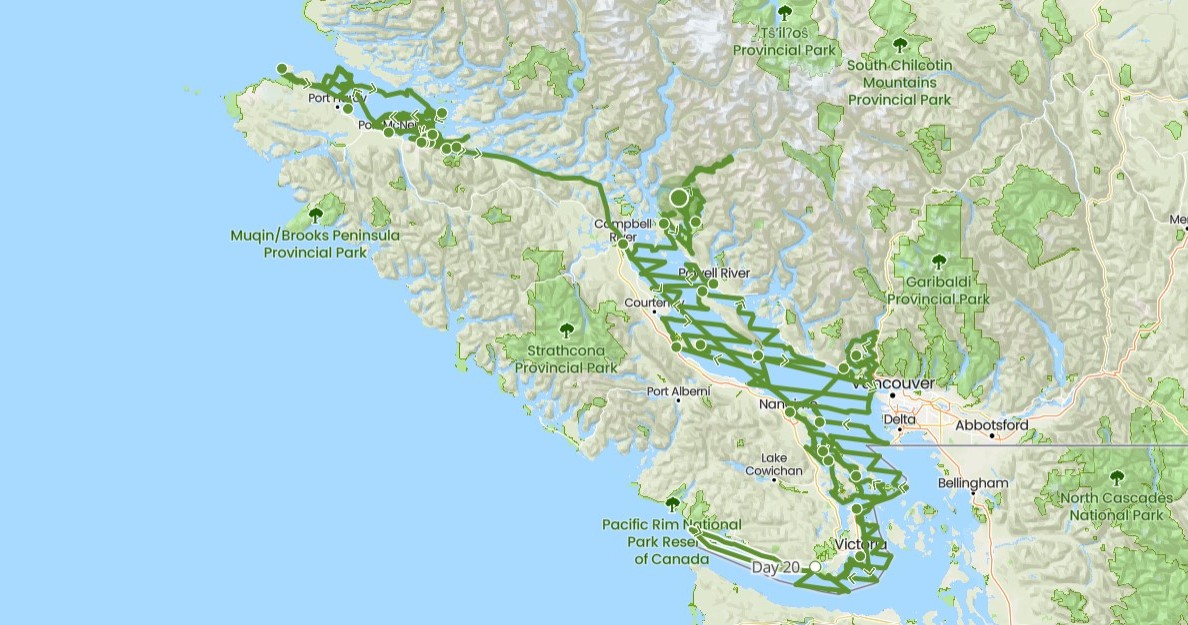The killer whales are speaking, but is the minister of transport listening?
Now is the time for a transition plan towards watertight regulations that can reverse the possibility of Southern Resident killer whales going extinct this century.
Studies have shown that killer whales’ ability to communicate is extremely sophisticated, but they still can’t seem to be able to get Transport Canada to understand them.
The endangered Southern Resident killer whale‘s home includes the Salish Sea on British Columbia’s west coast, which is largely designated for their protection. However, their habitat is a highway for an increasing number of cruise liners, tankers, and cargo vessels which run right through their home—where they feed, rest, meet, play, and give birth. There are only 74 known Southern Resident killer whales left in existence, and they are under perpetual threat by the noise, pollution, and a lack of food in this marine freeway.
For animals who rely on their ability to communicate—to hear each other—to forage, socialize, and raise their young, large ships can be deadly. Cruise liners are also responsible for two-thirds of shipping waste (PDF). That’s the equivalent of half the worlds’ population flushing a toilet into B.C.’s coastal waters every year.
Transport Canada had an opportunity to regulate the noise and pollution of marine traffic last month, but instead chose to cut and paste weak interim measures from last year. These temporary measures achieved little to protect killer whales. Now is the time to see a transition plan towards watertight regulations that can reverse the possibility of Southern Resident killer whales going extinct this century.
Weak pollution regulations and increasing marine traffic threaten the very thing that people want to see.
The minister of transport may not understand what killer whales are trying to say, but he can certainly understand us when we say that Southern Resident killer whales are facing dangers that can be prevented. The minister has the power to immediately activate solutions like regulating large ships to stop dumping their waste with impunity across the entirety of Canada’s coastal jurisdiction.
Most importantly, there needs to be an absolute ban on the use of scrubbers in Canada’s coastal jurisdiction to have any positive effect on the ecosystem. Scrubbers are a particular problem because of how they have been used to dupe regulators into believing that ships are operating sustainably when all they do is turn air pollution into water pollution. In 2022, Environment Canada calculated a whopping 88 million tonnes (PDF) of toxic scrubber wastewater entered B.C. coastal waters.
Scrubbers take pollution from the exhaust and dump it into the water. Scrubber wastewater is highly acidic, and contains metal contaminants linked to cancer, DNA damage, and the adverse maternal health of killer whales. For the shipping industry, they are a way to cheat and get a cleaner fuel rating for air exhaust while still burning cheap and dirty fuel. For killer whales they are a threat to their existence and recovery (PDF).
Transport Canada has an enormous opportunity to protect killer whales by simply aligning with other countries that have already made the evidence-based decision to ban the use of scrubbers. It also has the power to enable regular, independent monitoring—essential to ensure that ships on the marine freeway are following the rules.
The irony here is that part of the appeal of cruise ships is that they provide an opportunity for people to witness the amazing and fragile marine life on B.C.’s wild coast. However, weak pollution regulations and increasing marine traffic threaten the very thing that people want to see.
The endangered Southern Resident killer whales will now be feeling the impacts of a seven-fold increase in the number of petroleum tankers exporting oil products from the newly expanded Trans Mountain pipeline, and the continued growth in the number of cruise ships visiting coastal waters.
Canada’s minister of transport needs to listen to what the killer whales have been trying to say, and should enact better shipping pollution regulations and bring them into permanent policy. Acting today can turn the tide and ensure a thriving future for these animals for generations to come.
This article was originally published in The Hill Times on July 22, 2024.
You can help
Raincoast’s in-house scientists, collaborating graduate students, postdoctoral fellows, and professors make us unique among conservation groups. We work with First Nations, academic institutions, government, and other NGOs to build support and inform decisions that protect aquatic and terrestrial ecosystems, and the wildlife that depend on them. We conduct ethically applied, process-oriented, and hypothesis-driven research that has immediate and relevant utility for conservation deliberations and the collective body of scientific knowledge.
We investigate to understand coastal species and processes. We inform by bringing science to decision-makers and communities. We inspire action to protect wildlife and wildlife habitats.










